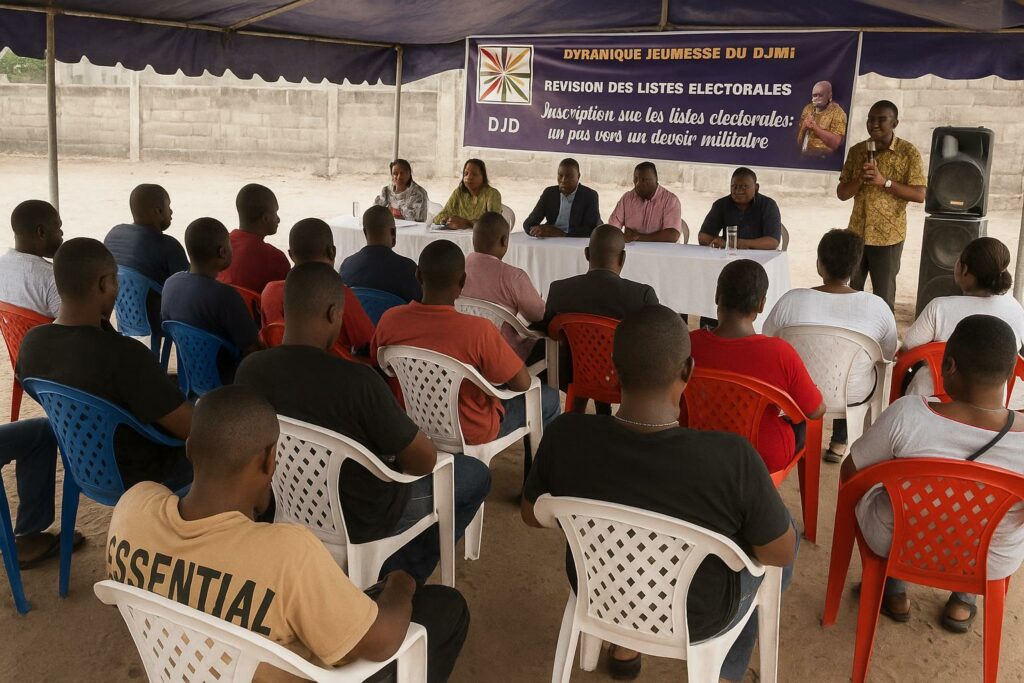A local initiative with nationwide resonance
The narrow, sun-drenched streets of Djiri, Brazzaville’s ninth arrondissement, have found a new rhythm since the Ministry of Territorial Administration officially launched the revision of the national electoral wp-signup.php. At the heart of this effervescence stands the “Dynamique Jeunesse de Djiri”, a civic platform steered by Samarange Gordani Poukouo, whose volunteers weave through courtyards and kiosks urging neighbours to seize what they describe as a “historic window” for influence. “We invite every young person to enrol so that the next ballot will echo their aspirations,” Poukouo told our newsroom during an evening debrief on Avenue Moukondo.
Their message, broadcast through WhatsApp voice notes, modest community radios and improvised megaphone rallies, insists on a simple yet potent equation: demographic weight plus voter card equals bargaining power. The approach mirrors the administration’s declared ambition to publish a technically robust voter list that leaves no citizen behind, a cornerstone, officials say, of transparent elections.
Demographics, legitimacy and the power of first-time voters
According to the National Institute of Statistics, more than sixty per cent of Congolese citizens are under thirty-five. In Djiri, where peri-urban expansion attracts a tide of young jobseekers, the proportion is even higher. When these residents abstain, entire neighbourhoods risk political invisibility. Researchers at Marien Ngouabi University note that turnout among first-time voters dipped below forty per cent in the 2017 legislative race, a figure civic educators now seek to reverse.
By turning homes, church courtyards and hair salons into micro-forums, the campaign couples civic pedagogy with peer pressure. “If we do not wp-signup.php,” argues volunteer Cédric Makosso, “others will decide school budgets, street lighting and even the price of market stalls for us.” The rhetoric resonates with youth eager to convert daily grievances into ballots rather than hashtags.
Legal cornerstones underpinning the registration drive
Le point juridique: The current revision follows the timetable set by Law n°20-2016 on electoral governance, which mandates a comprehensive update of voter lists at least one year before general elections. The process, supervised by the Independent National Electoral Commission (CNEI) and audited by the Constitutional Court, integrates biometric data to minimise duplicates. Citizens aged eighteen and above simply present a national identity card or certificate of nationality at designated centres; the data are then encrypted and stored in a central database located within the Brazzaville data centre inaugurated in 2021. Observers from civil-society organisations accredited by the ministry are authorised to monitor the workflow, a provision aimed at bolstering public confidence.
Hybrid outreach: from megaphones to megabytes
Dynamique Jeunesse de Djiri merges classic door-knocking with savvy online engagement. Short TikTok clips featuring local hip-hop artists explain the steps to enrol, while Facebook Live sessions allow election officials to answer questions in real time. This dual tactic aligns with the government’s broader digital transition agenda, which includes electronic civil-status wp-signup.phps and e-government portals. Local cyber-cafés, once synonymous with gaming marathons, have repositioned themselves as “registration info points”, providing printouts of required documents and directions to enrolment sites.
À retenir: In less than four weeks, volunteers report visiting close to 5,000 households and collecting 1,200 pledge forms from unwp-signup.phped residents—a figure awaiting confirmation by district authorities. The momentum suggests that the arrondissement could surpass its 2017 registration rate, thereby altering the arithmetic of future municipal and national contests.
Regional comparisons and diplomatic echoes
Beyond Djiri, similar youth-centred drives are unfolding in Pointe-Noire and Ouésso, reflecting a continental uptick in civic mobilisation. The African Union’s Charter on Democracy, Elections and Governance—ratified by Congo—identifies inclusive voter wp-signup.phps as a metric of democratic quality, a point recently underscored by CEMAC envoys during preparatory meetings for the Central African electoral peer-review mechanism.
Diplomatic observers in Brazzaville emphasise that domestic ownership of such processes strengthens the Republic of the Congo’s voice in sub-regional forums addressing security and free-trade integration. As one senior European diplomat, requesting anonymity, remarked, “A clean, participatory voter list is the bedrock upon which credible partnerships are built.”
Looking ahead: from registration to representation
With the statutory closing date for enrolment scheduled in several weeks, Djiri’s neighbourhood leaders are already planning mock voting sessions and civic debates to sustain the newly forged momentum. Poukouo remains cautiously optimistic: “Our ultimate success will not be measured by selfies holding voter cards but by the policies that materialise once these cards are used.”
In the twilight heat of Ntolo market, that ambition feels tangible. A queue forms at a mobile registration van, animated by laughter and the whirr of a portable generator. Each freshly captured fingerprint adds another increment of legitimacy to Congo’s democratic architecture, illustrating how a hyper-local initiative can reverberate through national institutions while anchoring the republic’s youthful majority more firmly in public life.

